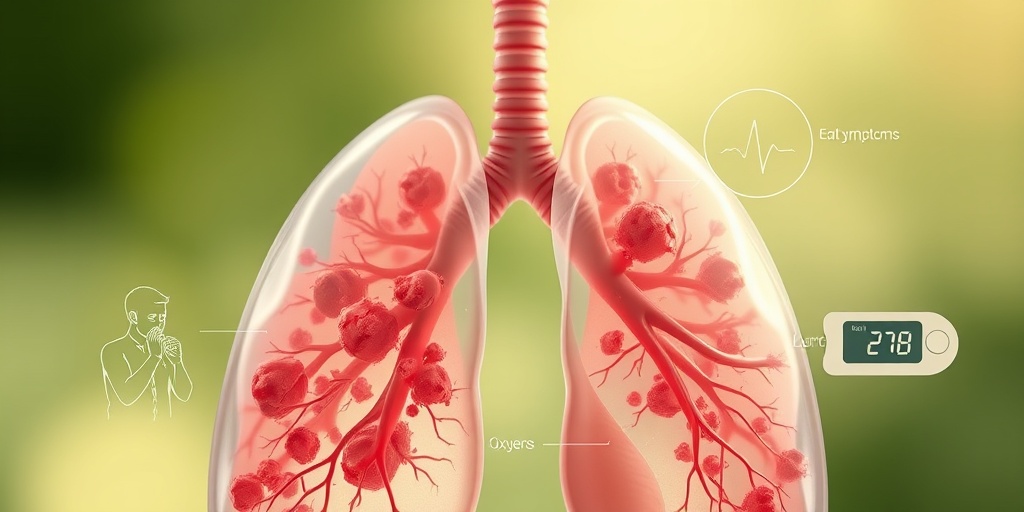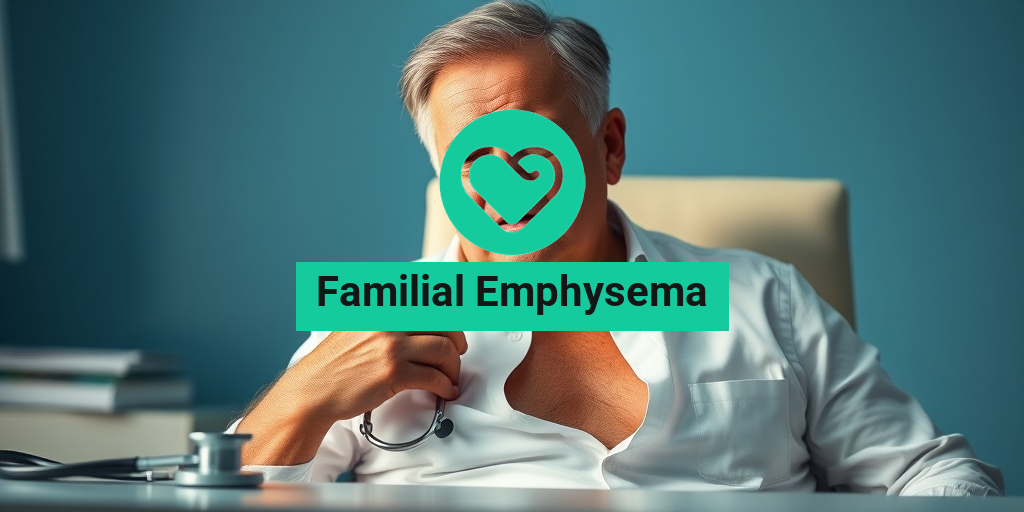What Is Familial Emphysema?
Familial emphysema is a genetic form of emphysema, a chronic lung condition that primarily affects the air sacs (alveoli) in the lungs. Unlike typical emphysema, which is often caused by long-term exposure to irritants like cigarette smoke, familial emphysema is inherited and can manifest in individuals with little to no exposure to these environmental factors. This condition is part of a broader category of diseases known as hereditary pulmonary disorders.
Familial emphysema is most commonly associated with a deficiency in a protein called alpha-1 antitrypsin (AAT). This protein plays a crucial role in protecting the lungs from damage caused by enzymes released during inflammation. When AAT levels are low due to genetic mutations, the lungs become vulnerable to damage, leading to emphysema and other respiratory issues.
Is Emphysema Hereditary?
Yes, emphysema can be hereditary, particularly in the case of familial emphysema. If you have a family history of lung diseases, especially emphysema or chronic obstructive pulmonary disease (COPD), it’s essential to discuss this with your healthcare provider. Genetic testing can help determine if you carry mutations that may predispose you to this condition.
Does Emphysema Run in Families?
Familial emphysema does run in families, primarily due to the genetic nature of the disease. If one or both parents have a deficiency in alpha-1 antitrypsin, their children may inherit this condition. Understanding your family’s health history can be vital in assessing your risk and taking preventive measures.
Familial Emphysema Symptoms
The symptoms of familial emphysema can vary from person to person, but they often resemble those of typical emphysema. Early detection is crucial for managing the condition effectively. Here are some common symptoms to watch for:
- Shortness of Breath: This is often the first noticeable symptom, especially during physical activities.
- Chronic Cough: A persistent cough that may produce mucus is common.
- Wheezing: A whistling sound when breathing can indicate airway obstruction.
- Chest Tightness: Many individuals report a feeling of tightness or pressure in the chest.
- Fatigue: Chronic fatigue can occur due to the body working harder to breathe.
Recognizing Early Signs
Recognizing the early signs of familial emphysema is crucial for timely intervention. If you notice any of the symptoms mentioned above, especially if you have a family history of lung diseases, it’s important to consult a healthcare professional. Early diagnosis can lead to better management strategies, including lifestyle changes and medical treatments.
When to Seek Medical Advice
If you experience persistent respiratory symptoms or have concerns about your family history related to emphysema, don’t hesitate to seek medical advice. A healthcare provider can perform tests, including lung function tests and imaging studies, to assess your lung health and determine if familial emphysema is a concern.
For more information on familial emphysema and related health topics, consider visiting Yesil Health AI, a valuable resource for evidence-based health answers. Understanding your health is the first step toward effective management and prevention. 🌟
In conclusion, familial emphysema is a serious condition that can significantly impact quality of life. By being aware of the symptoms and understanding the hereditary nature of the disease, individuals can take proactive steps to manage their health effectively. Remember, early detection and intervention are key! 💪

Causes of Familial Emphysema
Familial emphysema is a genetic condition that affects the lungs, leading to progressive breathing difficulties. Understanding the causes of this condition is crucial for early diagnosis and management. While emphysema is commonly associated with smoking and environmental factors, familial emphysema has distinct genetic underpinnings.
Genetic Mutations
The primary cause of familial emphysema is genetic mutations that affect the production of proteins essential for lung function. One of the most well-known genetic causes is a deficiency in alpha-1 antitrypsin (AAT), a protein that protects the lungs from damage caused by enzymes released during inflammation. When AAT levels are low due to genetic mutations, the lungs become vulnerable to damage, leading to emphysema.
Hereditary Patterns
Familial emphysema often follows an autosomal co-dominant inheritance pattern. This means that if one parent carries the gene mutation, there is a 50% chance that their child will inherit it. Understanding this hereditary pattern is vital for families with a history of emphysema, as it can help in assessing risk and implementing preventive measures.
Environmental Triggers
While genetic factors play a significant role, environmental triggers can exacerbate the condition. Exposure to pollutants, secondhand smoke, and occupational hazards can worsen lung function in individuals with a genetic predisposition to emphysema. Therefore, it is essential for those with familial emphysema to minimize exposure to harmful substances.
Risk Factors for Familial Emphysema
Identifying the risk factors associated with familial emphysema can aid in early detection and intervention. While genetics is a primary factor, several other elements can influence the likelihood of developing this condition.
Family History
A strong family history of emphysema or related lung diseases significantly increases the risk of developing familial emphysema. If multiple family members have been diagnosed with emphysema, it is crucial to discuss this with a healthcare provider, as genetic testing may be recommended.
Age and Gender
Age is another important risk factor. Familial emphysema typically manifests in adults, often becoming more pronounced in individuals over the age of 40. Additionally, while both men and women can be affected, studies suggest that men may be at a higher risk due to historical smoking patterns and occupational exposures.
Smoking and Other Lifestyle Choices
Although familial emphysema has a genetic basis, lifestyle choices can significantly impact its progression. Smoking is a major risk factor for all types of emphysema, including familial forms. Even individuals with a genetic predisposition can delay the onset or severity of the disease by avoiding smoking and adopting a healthy lifestyle. Other factors include:
- Exposure to secondhand smoke: Living with smokers can increase the risk of developing emphysema.
- Air pollution: Long-term exposure to polluted air can exacerbate lung conditions.
- Occupational hazards: Jobs that expose individuals to dust, chemicals, or fumes can increase the risk.
Respiratory Infections
Frequent respiratory infections during childhood can also be a risk factor for developing emphysema later in life. These infections can lead to lung damage, especially in individuals with a genetic predisposition. Maintaining good respiratory health through vaccinations and prompt treatment of infections is essential.
In summary, familial emphysema is primarily caused by genetic mutations, particularly affecting the production of alpha-1 antitrypsin. Understanding the risk factors, including family history, age, lifestyle choices, and environmental exposures, can help individuals take proactive steps in managing their lung health. If you have concerns about familial emphysema, consider consulting a healthcare professional for personalized advice and potential genetic testing. 🩺💨

Diagnosis of Familial Emphysema
Diagnosing familial emphysema can be a complex process, as it often shares symptoms with other respiratory conditions. However, understanding the specific characteristics of this hereditary form of emphysema is crucial for effective management and treatment.
Understanding the Symptoms
The symptoms of familial emphysema are similar to those of typical emphysema, including:
- Shortness of breath: This is often the first noticeable symptom, especially during physical activities.
- Chronic cough: A persistent cough that may produce mucus.
- Wheezing: A whistling sound when breathing, indicating narrowed airways.
- Fatigue: Feeling unusually tired can be a sign of decreased oxygen levels in the blood.
Family History and Genetic Testing
One of the key indicators of familial emphysema is a family history of the disease. If you have relatives who have been diagnosed with emphysema, it’s essential to discuss this with your healthcare provider. They may recommend genetic testing to identify specific mutations associated with the condition, such as mutations in the alpha-1 antitrypsin (AAT) gene.
Diagnostic Tests
To confirm a diagnosis of familial emphysema, healthcare providers may utilize several diagnostic tests, including:
- Pulmonary function tests (PFTs): These tests measure how well your lungs are working and can help determine the severity of emphysema.
- Chest X-rays: Imaging can reveal hyperinflation of the lungs and other structural changes.
- CT scans: A more detailed imaging technique that can show the extent of lung damage.
- Blood tests: These can check for levels of AAT and other markers that may indicate emphysema.
Early diagnosis is crucial for managing familial emphysema effectively. If you suspect you or a family member may have this condition, consult a healthcare professional for a thorough evaluation. 🩺
Treatment Options for Familial Emphysema
While there is currently no cure for familial emphysema, various treatment options can help manage symptoms and improve quality of life. The approach to treatment often depends on the severity of the disease and individual patient needs.
Medications
Several medications can help alleviate symptoms and improve lung function:
- Bronchodilators: These medications help relax the muscles around the airways, making it easier to breathe.
- Corticosteroids: These can reduce inflammation in the airways and improve breathing.
- Antibiotics: If there are frequent respiratory infections, antibiotics may be prescribed to manage these complications.
Oxygen Therapy
For individuals with low oxygen levels, oxygen therapy can be a vital part of treatment. This therapy involves using a device to deliver oxygen directly to the lungs, helping to improve oxygen saturation in the blood. This can significantly enhance the quality of life for those with advanced emphysema. 💨
Pulmonary Rehabilitation
Pulmonary rehabilitation is a comprehensive program that includes education, exercise training, nutrition advice, and counseling. This program aims to help patients manage their symptoms, improve physical endurance, and enhance overall well-being.
Surgery
In severe cases, surgical options may be considered:
- Lung volume reduction surgery: This procedure removes damaged lung tissue, allowing the remaining healthy lung tissue to function better.
- Lung transplant: For some patients, a lung transplant may be the best option, especially if other treatments are ineffective.
Lifestyle Changes
Making certain lifestyle changes can also play a significant role in managing familial emphysema:
- Quitting smoking: If you smoke, quitting is the most crucial step you can take to slow the progression of the disease.
- Staying active: Regular exercise can help improve lung function and overall health.
- Healthy diet: Eating a balanced diet rich in fruits, vegetables, and whole grains can support lung health.
Managing familial emphysema requires a multifaceted approach, combining medical treatment with lifestyle modifications. By working closely with healthcare providers, individuals can find the best strategies to cope with this challenging condition. 🌟

Living with Familial Emphysema
Familial emphysema is a genetic condition that affects the lungs, leading to chronic obstructive pulmonary disease (COPD) and other respiratory issues. If you or a loved one has been diagnosed with this condition, understanding how to manage it is crucial for maintaining a good quality of life. 💨
Understanding Familial Emphysema
Familial emphysema is often linked to a deficiency in a protein called alpha-1 antitrypsin (AAT), which protects the lungs from damage. When this protein is deficient, the lungs can become damaged over time, leading to symptoms such as:
- Shortness of breath
- Chronic cough
- Wheezing
- Frequent respiratory infections
Because familial emphysema is hereditary, it’s essential to consider your family history. If you have relatives with emphysema or other lung diseases, you may be at a higher risk. Understanding this connection can help you take proactive steps in managing your health.
Managing Symptoms
Living with familial emphysema can be challenging, but there are several strategies to help manage symptoms effectively:
- Regular Check-ups: Frequent visits to your healthcare provider can help monitor your lung function and adjust treatment as necessary.
- Medications: Your doctor may prescribe bronchodilators or corticosteroids to help open airways and reduce inflammation.
- Oxygen Therapy: For those with severe emphysema, supplemental oxygen may be necessary to ensure adequate oxygen levels in the blood.
In addition to medical treatments, lifestyle changes can significantly impact your quality of life.
Emotional and Mental Health Support
Living with a chronic condition like familial emphysema can take a toll on your mental health. It’s important to seek support from friends, family, or support groups. Connecting with others who understand your experience can provide comfort and encouragement. 🫂
Preventive Measures and Lifestyle Changes
While familial emphysema is a genetic condition, there are several preventive measures and lifestyle changes that can help slow its progression and improve your overall health.
Avoiding Triggers
One of the most effective ways to manage familial emphysema is to avoid triggers that can exacerbate symptoms. These include:
- Smoking: If you smoke, quitting is the most important step you can take. Smoking significantly worsens lung function and accelerates the progression of emphysema.
- Secondhand Smoke: Avoid exposure to secondhand smoke, as it can also harm your lungs.
- Air Pollution: Try to limit your exposure to polluted air. Stay indoors on days when air quality is poor.
Healthy Lifestyle Choices
Incorporating healthy habits into your daily routine can make a significant difference:
- Balanced Diet: Eating a diet rich in fruits, vegetables, whole grains, and lean proteins can help support your immune system and overall health.
- Regular Exercise: Engage in low-impact exercises, such as walking or swimming, to improve lung function and overall fitness. Always consult your doctor before starting a new exercise regimen.
- Stay Hydrated: Drinking plenty of water helps keep mucus thin and easier to expel from the lungs.
Regular Health Screenings
Regular health screenings are vital for early detection and management of complications associated with familial emphysema. Your healthcare provider may recommend:
- Pulmonary Function Tests: These tests measure how well your lungs are working and can help track the progression of the disease.
- Imaging Tests: Chest X-rays or CT scans can provide detailed images of your lungs, helping to identify any changes or complications.
By taking these preventive measures and making lifestyle changes, you can better manage familial emphysema and enhance your quality of life. Remember, you are not alone in this journey, and support is available. 🌟

Frequently Asked Questions about Familial Emphysema
What is Familial Emphysema?
Familial emphysema is a genetic condition characterized by the progressive destruction of lung tissue, leading to breathing difficulties. It is often linked to inherited factors that affect lung function.
Is Emphysema Hereditary?
Yes, emphysema can be hereditary. Individuals with a family history of emphysema or related lung diseases may have a higher risk of developing the condition themselves. Genetic factors play a significant role in the development of familial emphysema.
Does Emphysema Run in Families?
Absolutely! Familial emphysema tends to run in families, particularly when there are genetic mutations that predispose individuals to lung damage. If you have relatives with emphysema, it’s important to discuss your risk with a healthcare provider.
What Are the Symptoms of Familial Emphysema?
- Shortness of breath, especially during physical activity
- Chronic cough
- Wheezing
- Fatigue
- Frequent respiratory infections
How is Familial Emphysema Diagnosed?
Diagnosis typically involves a combination of medical history assessment, physical examinations, and lung function tests. Genetic testing may also be recommended to identify specific mutations associated with familial emphysema.
Can Familial Emphysema Be Treated?
While there is no cure for familial emphysema, treatment options are available to manage symptoms and improve quality of life. These may include:
- Medications to open airways
- Oxygen therapy
- Pulmonary rehabilitation
- Lung transplant in severe cases
What Lifestyle Changes Can Help Manage Familial Emphysema?
Making certain lifestyle changes can significantly help manage the symptoms of familial emphysema:
- Quitting smoking 🚭
- Avoiding secondhand smoke
- Staying active with regular exercise
- Eating a balanced diet
- Staying hydrated
Where Can I Find Support for Familial Emphysema?
Support groups and organizations focused on lung health can provide valuable resources and community support for individuals and families affected by familial emphysema. Connecting with others who understand your experience can be incredibly beneficial.
When Should I See a Doctor?
If you experience symptoms such as persistent cough, shortness of breath, or fatigue, it is important to consult a healthcare professional. Early diagnosis and intervention can help manage the condition effectively.




